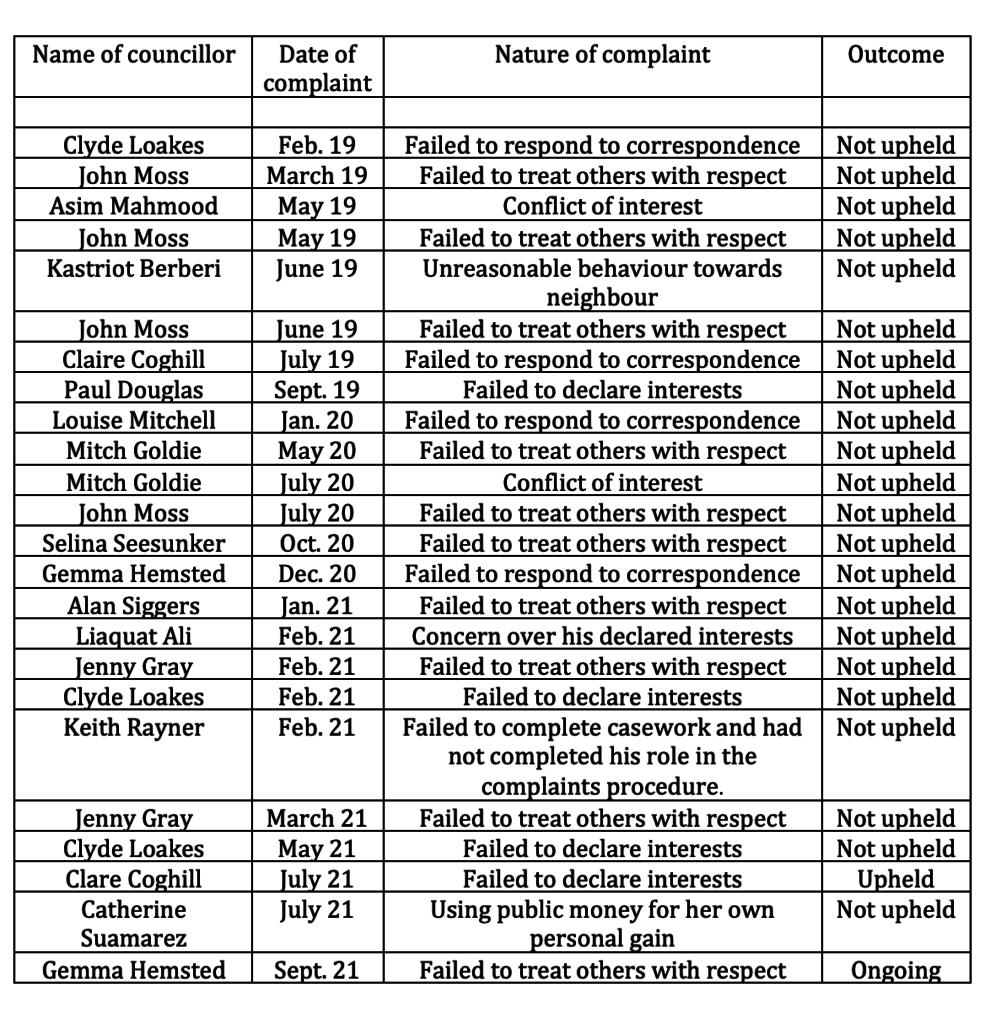Complaints by residents about Waltham Forest councillors: another can of worms
As many readers of this blog will know, Waltham Forest councillors must comply with the ‘Code of Conduct for Members’, Part Nine of the LBWF Constitution.
This document covers matters such a ‘General Standards of Conduct’ and ‘Registration of Pecuniary and Non-Pecuniary Interests’; applies only when councillors are acting in their official capacity; and is presided over by Mark Hynes, Director of Governance and Law.
An interesting question is what happens when councillors are alleged to have breached the Code, and here some recent data unearthed by indefatigable Walthamstow resident Charles Edwards is invaluable, not least because, regrettably, it points to some troubling conclusions.
In the summer of 2021, and using the Freedom of Information Act, Mr. Edwards requested ‘a list of all the councillors investigated for breach of the Councillor’s code of conduct in the last 5 years, name of councillor, date, what they were accused [of]…’ and the outcome, and in response received the following information:
As Mr. Edwards immediately recognised, this was only a partial answer to his request, as there was nothing about either 2018 or 2017.
So he asked LBWF to explain, and was told: ‘We can only provide you with information that we hold. The Director of Governance and Law has responsibility for all member breaches and has no emails before 2019 which have been deleted from his email folders’.
Looking at this in the round is discomforting. Quite why Mr. Hynes’ pre-2019 e-mails have been deleted remains to be explained. But leaving that issue on one side, to find that Mr. Hynes has rejected all but one of the 23 complaints he has adjudicated on is surprising, because in a comparative context such extraordinary uniform outcomes are (outside of North Korea) quite rare.
To quote one of several contrasting examples, in 2019-20, local residents took 29 complaints about the council to the Local Government Ombudsman, and of the 24 that were adjudicated on, nine were rejected, and the rest upheld.
It is, of course, possible that complainants about councillors are more willing than most to chance their arm; but it is also possible that Mr. Hynes’ investigations are superficial, and/or he is using an unreasonably high evidential bar.
Mr. Hynes might well retort that he has run the more complicated or contentious complaints past the Independent Person, Daniel Fluskey, but whether this safeguard is working remains unclear.
Mr. Fluskey’s CV is somewhat slight, but reveals that he is the grandiosely titled ‘Head of Policy and External Affairs’ at the relatively little known Institute of Fundraising, and has no obvious expertise in relation to local government.
Moreover, it’s a regrettable fact that, when asked under the Freedom of Information Act for the papers involved in two specific complaints, LBWF has refused access, stating that ‘The information sought is exempt under Section 40(2) as being personal data of the elected member concerned/complainant and Section 36 on the grounds that should investigative materials into member complaints be required to be put into the public domain this would or would be likely to lead to prejudice to the effective conduct of public affairs’.
A good complaints procedure will leave complainant and complainee, if not satisfied, at least fully reassured that their respective arguments have been evaluated on their merits, without fear or favour.
Against such a yardstick, the current procedure in Waltham Forest appears less than satisfactory. Residents will feel that the odds are stacked against them, while for their part, councillors who are found to have done nothing wrong will want that fact to be out in the open, and robustly explained, rather than hidden down a rabbit hole.
In short, Mr. Edwards endeavours have uncovered another can of worms.

